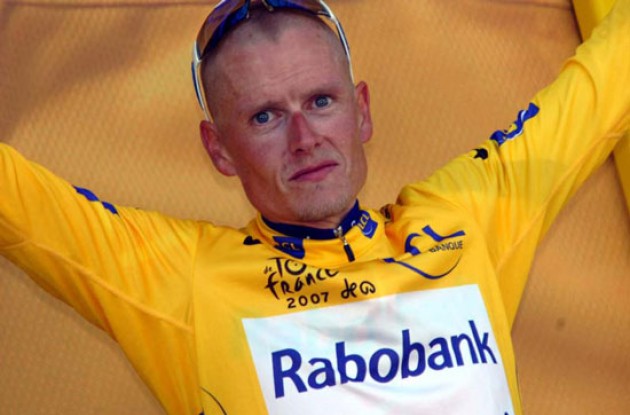Michael Rasmussen admits doping for more than a decade
Rasmussen, a climbing specialist who won stage victories in the Tour de France and Spanish Vuelta, said he took testosterone and growth hormones and had blood transfusions from 1998-2010 in an effort to boost his performance.
The 38-year-old Dane said he would quit the sport and cooperate with anti-doping agencies. In return, Danish anti-doping officials said they would seek a two-year suspension instead of the eight years that normally comes with a second violation.
"When I get up from here today and leave this room, it's as a very relieved man," Rasmussen said. "I no longer have a heavy burden to carry, like I have done for the last several years.
"I am happy that I don't have to sit and lie to you anymore when you ask about my past."
Rasmussen finished the Tour de France in 2005 and 2006 wearing the polka dot jersey as the best climber. He was overall leader of the 2007 Tour until he was withdrawn from the Tour by his Rabobank team when rumors of him lying about his whereabouts arose.
He later admitted that he had lied about his whereabouts and was banned from cycling for two years, but had insisted he didn't break any rules and never tested positive for any drugs.
Rasmussen's confession comes during a turbulent time for cycling, two weeks after Armstrong admitted he doped on his way to seven Tour de France victories.
This week, anti-doping authorities suspended Luxembourg cyclist Frank Schleck until July 14 after he tested positive for a banned substance during last year's Tour de France. Schleck has denied any wrongdoing.
Rasmussen said he was cooperating with anti-doping agencies in Denmark (Anti Doping Danmark), the Netherlands and the United States (USADA), as well as the World Anti-Doping Agency (WADA), in an effort to "help clean up the sport."
The Danish anti-doping agency confirmed that Rasmussen had agreed to "tell everything about his experiences with doping," and that he had already been interrogated in Amsterdam and Copenhagen.
"Rasmussen has confessed to having used doping throughout most of his career, including in 2007 when he wore the yellow jersey in the Tour de France and when he was unavailable for out-of-competition testing in the crucial period prior to the race," Anti-Doping Denmark said.
The agency's leader, Lone Hansen, said Rasmussen had provided "valuable information, not only about other doping offences, but also giving us valuable insights into an otherwise secret part of professional cycling."
He admitted to using EPO, a mix of growth hormones and cortisone, testosterone, insulin, the banned steroid DHEA, and blood transfusions.
"I am aware that I have cheated and lied," Rasmussen explained and added "I am ready to accept my punishment."
Rasmussen became mountain biking world champion before switching to road racing for teams including CSC-Tiscali and Rabobank.
Rasmussen's admission was the biggest doping scandal to hit Danish cycling since Bjarne Riis revealed in 2007 that he had used EPO to win the Tour in 1996. Riis is now owner and manager of Team Saxo-Tinkoff.








